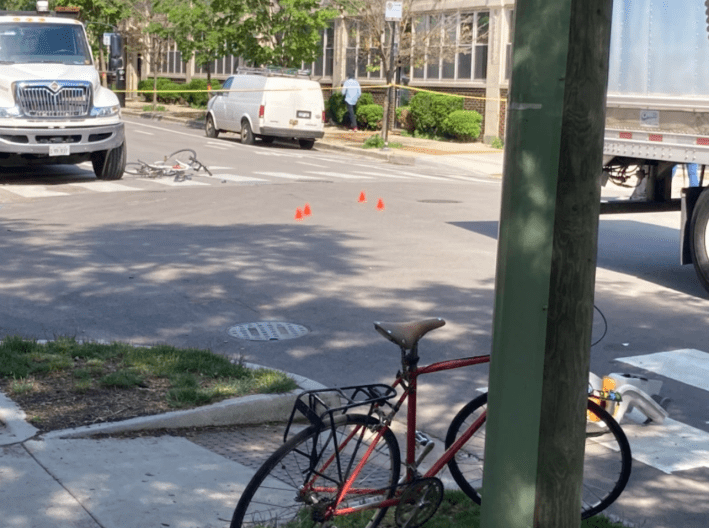The loss of a small child is the worst thing a parent can endure, and when the death is due to a preventable act of traffic violence, that must make the grieving process especially difficult. So it's commendable that the parents of Lily Shambrook, 3, who died in a bicycle crash in Uptown last June, are committed to making sure their daughter's legacy is to help create safer conditions for other people on bikes.
On June 9, Lily was riding on the back of her mother's bicycle in a bike lane, heading east on the Leland Avenue Greenway bike-priority street. Just before Winthrop Avenue, they encountered a ComEd truck illegally parked in the bikeway, forcing the mom to merge into the travel lane. At the stop sign, they were overtaken by a Mondelez semi truck driver, who clipped the bike, causing it to fall. Lily was thrown under the wheels of the 18-wheeler, and the toddler was dragged 20 to 30 feet. The trucker stopped just past the intersection, but by that point it was too late to save the girl.
A video from Clifford Law Offices showing the layout of the crash.
Yesterday Lily's parents filed a lawsuit with the goal of holding the involved corporations and the city of Chicago responsible for their child's death. According to attorney Richard Burke from Clifford Law Offices, which is representing them, their goal is not just to get justice for their daughter, but to raise awareness and respect for bike riders and bikeways.
"They are absolutely still devastated and grieving," Burke said. "I don't think they will ever completely get over it. She was a lovely little girl, and this was obviously just a disastrous occurrence."
"People have to care," Lily's family said in a statement. "The city has to care. Corporations have to care. They all need to respect bicycle lanes and the bicyclists using them. Hopefully, this lawsuit will open the eyes of many because we would never want this tragedy to happen to any other family anywhere."
Press conference on the lawsuit with attorneys and Christina Whitehouse from Bike Lane Uprising, and organization that advocates for safer bikeways and helps plan memorials to fallen cyclists.
The named defendants in the suit include ComEd, Mondelez, Penske (the trucking firm that owns the Mondelez vehicle), and the city of Chicago. The complaint was filed in the law division of the Cook County Circuit Court, and alleges that the companies and the drivers were negligent, as was the city for failing to prevent the ComEd trucker from blocking the bike lane.
"As far as we're concerned, those large trucks shouldn't have been on a two-lane side street that's a bike lane street and a designated greenway route," Burke said, noting that the Mondelez trucker should have instead used Wilson Avenue, a retail street a block south, as a through route. (Lawrence Avenue, a block north, currently has a low CTA viaduct.)
While ComEd has a permit to park the truck and equipment on Winthrop, it did not have permission to block Leland, Burke noted. He added that the truck was illegally parked within 30 feet of the stop sign, which blocked sight lines for people crossing the street, and it was actually partially blocking a crosswalk.

The Mondelez trucker was also culpable, not only because he should have chosen a different route, but because he wasn't paying proper attention to vulnerable road users, Burke argued. The attorney also noted that the trucker was so unaware of what was going on a around him, he didn't immediately stop after the mother fell and the child went under the truck wheels, but he only hit the brakes after Lily's father and bystanders were screaming and pounding on the vehicle.
As for the city's liability in the case, Burke said ComEd shouldn't have been allowed to park heavy equipment on Winthrop, so close to the Leland bike lanes. Moreover, he added, "the city wasn't taking adequate measures to ensure ComEd wasn't usurping the bike lane," such as sending out an inspector to ensure trucks and gear were only parked in the permitted area.
The family is seeking monetary compensation, in an amount to be determined. However, Burke says the ideal outcome of the case would also include, "heightened awareness of and respect for the purpose of bike lanes, and increased education of individuals and corporations so that they don't park in bike lanes." He added that Lily's parents also want to see the city make more improvements to the safety of bikeways, such as building more physically protected bike lanes.
Already Lily's story has resulted in the city of Chicago committing to adding concrete curb barriers to all existing protected bike lanes, as well as passing an ordinance to allow for towing bike lane blockers. Hopefully one result of this lawsuit will be corporations, commercial drivers, and city officials prioritizing cyclist safety, knowing that there could be serious financial consequences if they don't. That would help ensure that Lily's passing will not have been in vain.

If you appreciate Streetsblog Chicago's livable streets coverage, please consider making a tax-deductible donation to help us raise $50K by 1/31 to fund our next year of reporting. Thank you.




